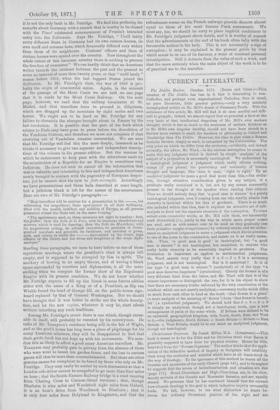CURRENT LITERATURE.
The Dublin Review. October, 1871. (Burns and Oates.)—This number of The Dublin has less in it that is interesting to non- Catholics, and perhaps oven unprofessional Catholics, than is usual, no pure literature, little general politics,—only a very masterly metaphysical article on Mr. Mill's denial of Necessary Truth. With the substance of this article Mr. Mill will find it at once needful and diffi- cult to grapple ; indeed, we almost regret that so powerful a blow at the very basis of that intellectual despotism of Mr. Mill's over modern thought, which is duo as much to the weakness of modern thinkers as to Mr. Mill's own singular lucidity, should not have been struck in a Review more certain to roach the teachers of philosophy In Oxford and Cambridge than The Dublin. However, the time is past when a Roman Catholic Review, simply as such, is ostracized by the Universities. The only point on which wo differ from the reviewer,--evidently, and indeed avowedly, the editor, Mr, Ward,—is the curious assumption he seems to make that any judgment which is derived by simple ' analysis' of the subject of a proposition is necessarily tautological. We understand by a tautological judgment a judgment which really affirms nothing, except (if you please) tho persistency and continuity of human thought and language, like ' man is man,' right is right.' By an analytical judgment wo moan a good deal more than this,—the evolu- tion, through attentive consideration given to any subject, of a predicate really contained in it, but not by any means necessarily present to the thought of the speaker when naming that subject. Thus we should entirely deny that ' a good man is sincere' is a purely tautological judgment, even if coming from one who readily admits that shoerity is included within his idea of goodness. There is so much else included within that idea, that it requires an attentive act of self- analysis to draw out the separate elements of the conception. To some extent oven connotative words, as Mr. Mill calls them, are necessarily used denotatively (i.e., partly in the way in which mere proper names are used, and as nick-names come to be used as they gradually lose their primitive weight of significance) by ordinary minds, and we under- stand an analytical judgment to moan a judgment which draws attention to one of the notes in the connotation, and insists on it as really essen-
tial. Thus, a good man is good ' is tautological, but " a good. man is sincere " is not tautological, but analytical, to anyone who really holds sincerity to be essentially implied in goodness. The distinction is important as applied to mathematical judgments.
Mr. Ward asserts very justly that 3 8 = 2 + 9 is a necessary judgment, and is not tautological. But is it analytical ? Is it of the type "a good man is sincere"? (analytical) or of tho type "a good man deserves happiness " (synthetical). Clearly the former is of a very different kind from the latter, and Mr. Ward will find it of the utmost importance to distinguish the two, for it is his object to show that there are necessary truths enforced by the very constitution of the intellect which are not merely analytical,—necessary truths which differ as much from each other in kind as the truth ' that flower is a plant' (a more analysis of the meaning of flower ') from that flower is beauti-
ful' (a synthetical judgment). We should hold that 3 + 8 :::-. 2 9 is simply an analytical, though not a tautological truth, just a new arrangement of parts of the same whole. If Britain wore defined to be an extended geographical kingdom, with North, South, East, and West
in it,—the judgments, North Britain South Britain =Britain =East Britain West Britain, would be to our mind an analytical judgment, though not tautological.


































 Previous page
Previous page